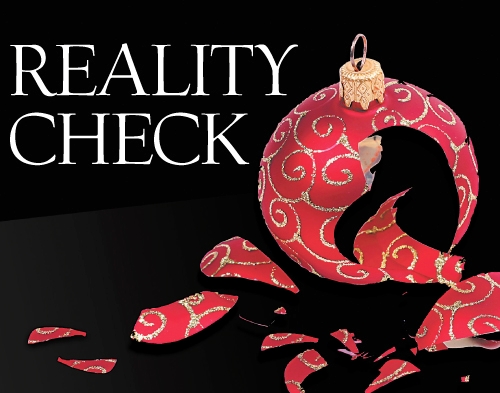Expecting too much of others can make holidays depressing


If you’re feeling blue during what should be one of the happiest, most perfect times of the year, it may be because you expect it to be one of the happiest, most perfect times of the year. And in reality, it’s, well, reality.
This is, in fact, prime time for depression, therapists say.
"Thanksgiving sort of starts it, and it rolls right into Christmas and from Christmas to the new year," said David J. French, the Los Angeles-based director of psychological services for CareMore, which contracts with some local hospitals. "It’s an emotional time of year. It’s like going to Disneyland, you feel little again. On Christmas Eve, I want to believe I’ll see Santa and his reindeer. "
"People tend to have expectations," noted Markie Blumer, an assistant professor in the marriage and family therapy department at the University of Nevada, Las Vegas.
They have a whole list of things they want to get done. They want all of their friends and loved ones to be there. They want the food to be flawless, the decorations to dazzle.
"When it doesn’t live up to the expectation, it sets them up for failure," Blumer said. "Then you feel really bad."
Katherine Hertlein, an associate professor of marriage and family therapy at UNLV, said the prevalence of holiday depression varies from family to family, and tends to be linked to interactions you have with members of your family. That may apply to relatives you’d like to spend time with but can’t, and those who you will be spending time with but maybe shouldn’t.
"The fact is, families are families," Hertlein said. If your niece is totally self-centered and your sister is in denial about it, that won’t change just because it’s Christmas.
She cautioned against expecting otherwise — "that people are going to show up and things are going to be different, that people are going to behave differently in our family than they do the 11 other months of the year. Your mother or father or sister is going to be the way they’re going to be and aren’t going to change just because of the holidays."
Familiarity, it seems, really can breed contempt.
"With some people’s families, they have to sit together around the Thanksgiving table or around the Christmas tree with people they really aren’t that comfortable with," French said. "There’s an undercurrent of discomfort. You’re obligated to be together, to have to sort of show up and be extraordinarily fake and pretend you’re happy."
Stress, Hertlein said, can aggravate a situation already fraught with tension.
And so, Blumer said, can alcohol.
"As we know, as you increase your alcohol intake, feelings of depression go up because alcohol is a depressant," she said. "If the turkey’s burned, you have a glass of wine that turns into a bottle and you’re more depressed."
And there’s yet another factor, French and Blumer said: seasonal affective disorder, linked to the shorter days at this time of year.
"We start to feel depressed because we have less light available to us," Blumer said.
However, she said: "there are things we can do."
First, Blumer recommended, make sure your expectations are manageable. Set realistic goals, not only for yourself but for those around you. Pace yourself, prioritize and organize.
"You don’t have to feel perfect or like you’re doing things better than you’ve ever done them in your life," Blumer said. "It’s just a time to feel good, not a time to set yourself up for failure."
It’s also important to live in the present and not dwell on the past, she said.
"People are reminded of what was going on the year before," French said. "If Grampa died, this is the first Christmas or Thanksgiving he’s not there."
Hertlein said it’s important to feel you have an exit strategy — a way to escape when you feel your depression growing.
"Remove yourself from the situation, either mentally or physically," she said. If you find time with family particularly stressful, give yourself some breaks.
"Plan to spend time with friends or other people," she said. "Plan an outing — ‘Oh, gee, I have to run out. Already had the engagement, so sorry.’ "
If you can, talk to someone about being a support person, should you need to contact them.
"People usually fare better, just knowing the help is there," Hertlein said.
Don’t underestimate the value of deep breathing.
"Nobody really notices that you’re doing it, which is the great thing," she said.
And consider reaching outside your immediate situation, perhaps doing some volunteer work. Participating in activities that enable you to give of yourself can provide a sense of purpose and identity, Hertlein said. It can change the definition of yourself that may have been imposed by others.
"The family doesn’t have the same amount of power over you," she said.
"I think there are a lot of options," Blumer said. "You just have to be creative and open. It’s really not about being perfect, it’s about being kind and considerate and loving and giving."
Because those nonperfect holidays can be joyous.
"Lying under the Christmas tree, looking up at the lights, makes you feel little again," French said. "It really is magical. I think that’s the part none of us want to lose."
Contact reporter Heidi Knapp Rinella at hrinella@reviewjournal.com or 702-383-0474.












